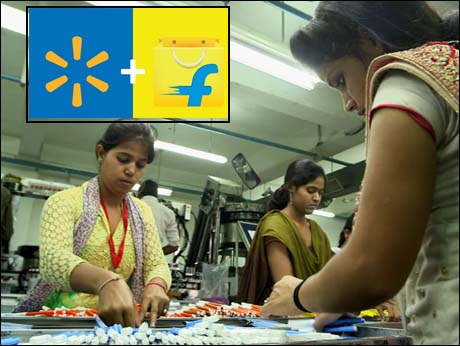
Bangalore, May 9 2018: Global retail giant Walmart is to gain control of Indian e-tailing giant FlipKart in a $ 16 billion deal that will give it a 77 percent shareholding ... making this the biggest e-commerce deal in this country.
A simultaneous announcement today in Bangalore and Bentonville, Arkansas, US, said, Walmart had signed definitive agreements to become the largest shareholder in Flipkart Group. The remainder of the business will be held by some of Flipkart’s existing shareholders, including Flipkart co-founder Binny Bansal, Tencent Holdings Limited, Tiger Global Management LLC and Microsoft Corp. While the immediate focus will be on serving customers and growing the business, Walmart says it supports Flipkart’s ambition to transition into a publicly-listed, majority-owned subsidiary in the future.
“India is one of the most attractive retail markets in the world, given its size and growth rate, and our investment is an opportunity to partner with the company that is leading transformation of eCommerce in the market,” said Doug McMillon, Walmart’s president and chief executive officer. “As a company, we are transforming globally to meet and exceed the needs of customers and we look forward to working with Flipkart to grow in this critical market. We are also excited to be doing this with Tencent, Tiger Global and Microsoft, which will be key strategic and technology partners. We are confident this group will provide Flipkart with enhanced strategic and competitive advantage. Our investment will benefit India providing quality, affordable goods for customers, while creating new skilled jobs and fresh opportunities for small suppliers, farmers and women entrepreneurs.”
“This investment is of immense importance for India and will help fuel our ambition to deepen our connection with buyers and sellers and to create the next wave of retail in India,” said Binny Bansal, Flipkart’s co-founder and group chief executive officer. “While eCommerce is still a relatively small part of retail in India, we see great potential to grow. Walmart is the ideal partner for the next phase of our journey, and we look forward to working together in the years ahead to bring our strengths and learnings in retail and eCommerce to the fore.”
Founded in 2007, Flipkart has led India’s eCommerce revolution. The company has grown rapidly and earned customer trust, leveraging a powerful technology foundation, including artificial intelligence, and emerging as a leader in electronics, large appliances, mobile and fashion and apparel. In a market where Walmart expects eCommerce to grow at four times the rate of overall retail, and with well-known platforms such as Myntra, Jabong and PhonePe, Flipkart is uniquely positioned to leverage its integrated ecosystem, which is defined by localized service, deep insights into Indian customers and a best-in-class supply chain. Flipkart’s supply chain arm, eKart, serves more than 800 cities, making 500,000 deliveries daily.
Currently, Walmart India operates 21 Best Price cash-and-carry stores and one fulfillment center in 19 cities across nine states in India, with more than 95 percent of sourcing coming from India, aiding suppliers, creating skilled jobs and contributing to local economies across the country. Krish Iyer, president and chief executive officer of Walmart India, will continue to lead that part of the business.
“Flipkart has established itself as a prominent player with a strong, entrepreneurial leadership team that is a good cultural fit with Walmart,” said Judith McKenna, president and chief executive officer of Walmart International.
Analyst comment:
Adrian Lee, Research Director, Gartner says:
This should not be observed without mention to Alibaba Group’s intent to become the third player in India.
I see the competition getting more aggressive as Amazon counteroffers Walmart for a stake in Flipkart. Both have their own sizeable cash reserves, and the outcome in India will determine the access to its growing middle class consumers for dominance, outside of the U.S.
Consumers should not expect significant changes in their shopping experience. However, user choice should be improved, with a greater range of Walmart private labels differentiating the merchandise. Flipkart will diversify its inventory to attract more Indian consumer segments that still haven’t started shopping online.
as ecommerce penetration in India remains low (at 15%), I fully expect discounts/promotions to continue unabated. As the ecommerce players mature into more profitable businesses, it is very unlikely that discounts will stop. More of the promotional support will be passed back to the suppliers who want the user traffic